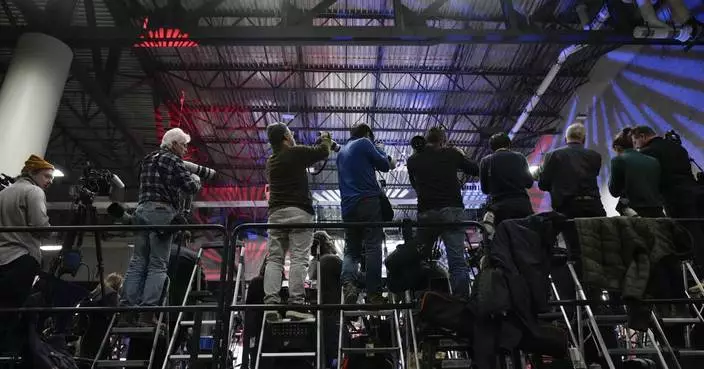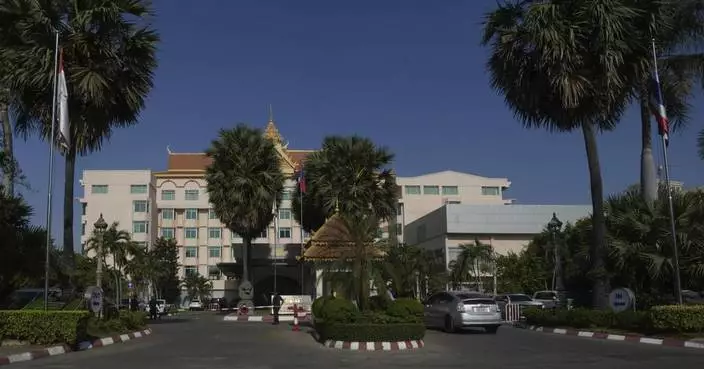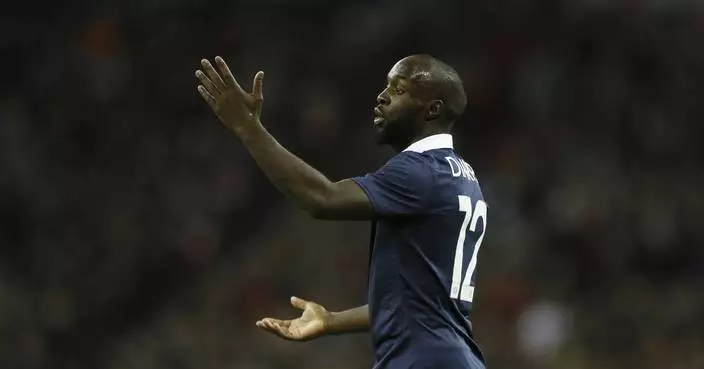The contest to be Britain's next prime minister shrank to five candidates on Tuesday, with Boris Johnson bolstering his substantial lead in the second round of voting by Conservative Party legislators.
The ultimate victor will replace Prime Minister Theresa May, who resigned as party leader this month after failing to persuade Parliament to back her plan for leaving the European Union.
Here's who is still in the running:
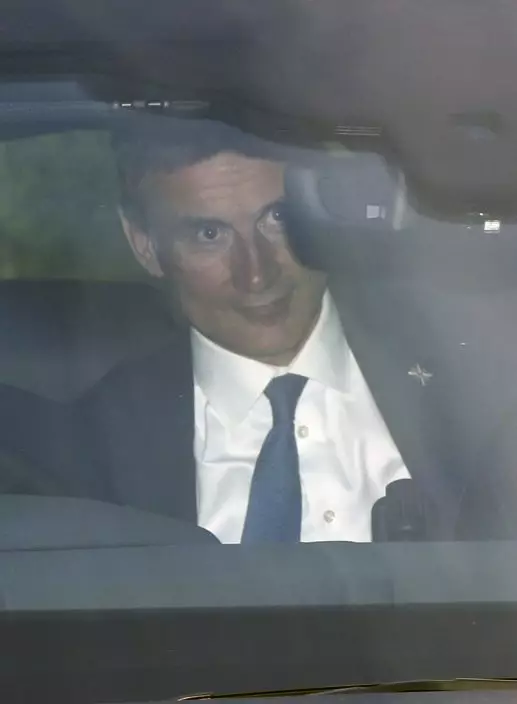
Conservative party leadership contender Jeremy Hunt arrives at the television studios ahead of a scheduled live television debate for the Conservative Party leadership candidates, in London, Sunday June 16, 2019. Five out of the six candidates will appear in the first TV debate, with Boris Johnson declining to take part, although other candidates accuse him of trying to avoid scrutiny. (Yui MokPA via AP)
— BORIS JOHNSON, 54:
The former London mayor and British foreign secretary is finally within touching distance of his long-cherished ambition to be U.K. prime minister. He got 126 of the 313 votes and looks almost certain to be one of the two finalists who will go to a ballot of all 160,000 Conservative Party members nationwide.
Johnson's jokes and Latin quips have made him one of the Conservative Party's most popular politicians. But verbal blunders, glibly offensive comments and untrue statements also have led some to question his fitness for high office.
Johnson's team is keeping him on a tight leash, rationing his public appearances in an attempt to avoid any gaffes that could derail his campaign.
A leading figure in the 2016 campaign to leave the European Union, Johnson takes a tough line on Brexit. He has vowed that Britain will withdraw from the EU on Oct. 31, with or without a withdrawal agreement that some economists warn is needed to prevent chaos. He also threatened to withhold a 39 billion pound ($50 billion) divorce payment if the EU plays hardball.
That has won him the backing of hard-line Conservative Brexiteers. But he is also, and somewhat paradoxically, supported by many Tory moderates who claim he has the skills to unite the party and win back voters from rival parties on both left and right.
— JEREMY HUNT, 52:
Hunt, who came second on Tuesday with 46 votes, has held a variety of Cabinet posts and served as foreign secretary since Johnson resigned in July over Brexit. Regarded as well-versed in making Britain's bureaucracy work, he managed to navigate a heated contract dispute with doctors in the National Health Service as health secretary.
Hunt has a reputation for being calm under pressure and a good communicator, but some doubt he is flashy enough to excite the electorate.
Hunt backed the losing "remain" side during the 2016 EU membership referendum that yielded Brexit, but now says he would negotiate a better withdrawal deal with the EU and lead the U.K. out of the bloc.
— MICHAEL GOVE, 51:
Like Johnson, Gove helped lead the campaign to leave the European Union, but scuttled his friend Johnson's bid to become prime minister in 2016 when he unexpectedly withdrew his support and decided to run for the job himself. The move left him with a lingering taint of treachery in the eyes of some Conservatives.
Gove has held several posts in May's government — he's currently environment secretary — and backed her Brexit policies even as former colleagues denounced May's Brexit withdrawal deal with the EU. That hurts him among hardcore Brexiteers, who believe he went soft by supporting May's deal.
Gove is also facing pressure after acknowledging that he used cocaine more than once before entering politics.
— RORY STEWART, 46:
The campaign's big surprise, International Development Secretary Rory Stewart is the self-styled "anti-Boris" candidate. He has unsettled rivals by accusing Johnson and his other opponents of peddling "fairy tales" about getting a better Brexit deal than that offered by May.
Stewart has pushed for compromise and warned against leaving the EU without a deal — a position that has won him the support of those whose leanings were to remain.
Stewart has been traveling the country talking to British voters and producing endearingly amateurish social media videos. He has the most eye-catching background of any candidate: a onetime tutor to Princes William and Harry, Stewart once walked across Afghanistan and was a deputy provincial governor in Iraq after the 2003 U.S.-led invasion.
Stewart has also faced questions about whether he has worked as a British spy. He denies it — but notes that former spies are barred by law from disclosing their past in espionage.
— SAJID JAVID, 48:
Javid's background as the son of Pakistani immigrants sets him apart from many other Conservative contenders. A former banker who was elected to Parliament in 2010, he is a champion of the free-market, libertarian wing of the party.
During the 2016 referendum, Javid was on the "remain" side but has since embraced Brexit. However, some Brexiteers remain suspicious of his allegiances. He says he would make getting a new deal with the EU his "absolute priority" and does not favor walking away without a divorce agreement, though would do so as a last resort.
As British home secretary, responsible for immigration and borders, he raised his profile by taking aggressive action to curtail the arrival of small boats carrying migrants across the English Channel.
He has also displayed an ability to make fun of himself and his lack of glitz, contrasting his relatively humble roots to the elite backgrounds of Johnson and other rivals.
"I don't have the oratory of Cicero," he said. "It's less Homer's Iliad and more Homer Simpson."
Follow AP's full coverage of Brexit and the Conservative Party leadership race at: https://www.apnews.com/Brexit
BEIRUT (AP) — The European Union announced Thursday an aid package for Lebanon of 1 billion euros — about $1.06 billion — much of which will go to boost border control to halt the flow of asylum seekers and migrants from the small, crisis-wracked country across the Mediterranean Sea to Cyprus and Italy.
The deal follows other EU aid packages for countries such as Egypt, Tunisia and Mauritania to fortify their borders. It comes against a backdrop of increasing hostility toward Syrian refugees in Lebanon and a major surge in irregular migration of Syrian refugees from Lebanon to Cyprus.
European Union Commission President Ursula von der Leyen said during a Beirut visit with Cypriot President Nikos Christodoulides that the aid distribution will start this year and last till 2027.
The bulk of the aid — 736 million euros — would go to support Syrian refugees “and other vulnerable groups” in Lebanon, while 200 million euros are meant to bolster Lebanese security services in enforcing border and migration control, according to figures provided by the Cypriot government.
An unspecified amount would go to Lebanese fishermen, to discourage them from selling their boats to smugglers.
Von der Leyen said the EU will also work on a “more structured approach to voluntary return" of Syrian refugees "in close cooperation with” the U.N. refugee agency. The bloc will continue to maintain “legal pathways” for resettlement of refugees in Europe, she said.
Lebanon's caretaker Prime Minister Najib Mikati praised the package, saying that “Lebanon’s security is security for European countries and vice versa,” and that an escalation of the crisis ”will not be limited to Lebanon but will extend to Europe."
Lebanon, which has been in the throes of a severe financial crisis since 2019, hosts nearly 780,000 registered Syrian refugees and hundreds of thousands more who are unregistered, the world's highest refugee population per capita.
Lebanese political officials have for years urged the international community to resettle the refugees in other countries or assist their return to Syria — voluntarily or not. Lebanese security forces have stepped up deportations of Syrians over the past year.
Tensions further flared after an official with the Christian nationalist Lebanese Forces party, Pascal Suleiman, was killed last month in what military officials said was a botched carjacking by a Syrian gang. The incident prompted outbreaks of anti-Syrian violence by vigilante groups.
Meanwhile, Cypriot authorities complain the island nation has been overwhelmed by irregular migration of Syrian asylum seekers, many of them coming on boats from Lebanon.
The UNHCR in Lebanon said it had verified 59 “actual or attempted” departures by boats carrying a total of 3,191 passengers from Lebanon between January and mid-April, compared to three documented boat movements carrying 54 passengers in the same period last year. Usually, few boats attempt the much more dangerous crossing in the winter. In all of 2023, UNHCR recorded 65 boat departures carrying 3,927 passengers.
Cyprus has taken a new approach to halting the flow of migrants. Last month, it suspended processing of Syrian asylum applications, and human rights groups accused the Cypriot coast guard of forcibly turning back five boats carrying about 500 asylum seekers coming from Lebanon. Cypriot officials have denied this.
Bassel al-Shayoukh, a Syrian refugee from Idlib living in Lebanon since 2014, said his brother and several cousins and nephews were on one of the boats turned back. Now he wants to make the journey himself.
“In the beginning I thought that in a year or two the war would be over in Syria,” he said, but it dragged on, while in Lebanon “every year ... the situation began to get worse.”
Shayoukh said he fears being beaten by vigilantes or deported to Syria after Lebanese authorities declined to renew his residency permit.
His 17-year-old nephew, who declined to give his name fearing for his safety, said the Cypriot coast guard started making waves to push the boat he was on away. “I was terrified... I don’t know how to swim,” he said. “I thought we were going to die.”
The people on the boats “stayed three days without food or water” before turning back to Lebanon, the teen added.
Back in Lebanon, they were detained by the army; those registered with UNHCR were released and the others deported.
Mohammed Sablouh, a Lebanese human rights lawyer who works on refugee and migrant cases, says Lebanese authorities are deliberately “turning a blind eye" to the surge in migration to "pressure the international community.”
The Lebanese army did not respond to a request for comment on their measures to combat smuggling.
Thursday's aid announcement comes ahead of the annual fundraising conference for the Syrian crisis in Brussels later this month. After 13 years of civil war, donor fatigue has set in while the world’s attention is occupied by the humanitarian fallout of more recent conflicts in Ukraine and Gaza.
The Cypriot president said Thursday was a “historic day” and called for European officials to go farther and declare some areas of Syria safe for return.
“The current situation is not sustainable for Lebanon. It is not sustainable for Cyprus, it is not sustainable for the European Union,” Christodoulides said.
But not all Lebanese officials are convinced the European aid would solve the problem.
Lebanese Forces party head Samir Geagea told The Associated Press earlier this week that European authorities are mainly concerned “that the refugees don’t go to Europe."
"For us the problem is that we cannot have our country drowning in illegal Syrian refugees,” Geagea said, urging for Syrians to be sent back to either government or opposition-held areas of the neighboring country.
But Shayoukh says he has nowhere to go.
The Damascus government wants him for opposing Syrian President Bashar Assad, he said, while the Islamist group that now controls his hometown behaves "the same way as the regime’s intelligence services” in crushing dissidents.
Associated Press writer Menelaos Hadjicostis in Nicosia, Cyprus, contributed to this report.
Follow AP’s global migration coverage at: https://apnews.com/hub/migration

Lebanese caretaker Prime Minister Najib Mikati, center, speaks during his meeting with Cyprus' President Nikos Christodoulides, left, and President of the European Commission Ursula von der Leyen at the government palace in Beirut, Lebanon, Thursday, May 2, 2024. (AP Photo/Hassan Ammar)
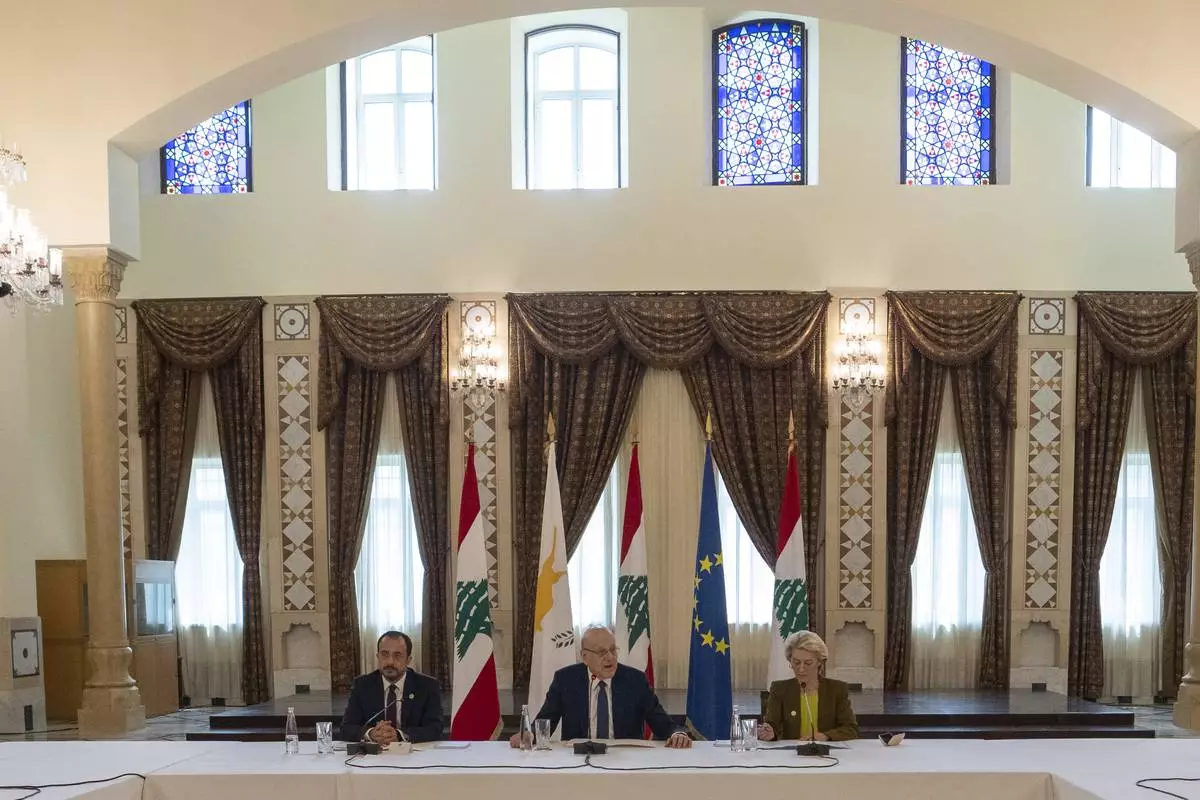
Lebanese caretaker Prime Minister Najib Mikati, center, speaks during his meeting with Cyprus' President Nikos Christodoulides, left, and President of the European Commission Ursula von der Leyen at the government palace in Beirut, Lebanon, Thursday, May 2, 2024. (AP Photo/Hassan Ammar)

Lebanese caretaker Prime Minister Najib Mikati, center, welcomes Cyprus' president Nikos Christodoulides, left, and President of the European Commission Ursula von der Leyen before their meeting at the government palace in Beirut, Lebanon, Thursday, May 2, 2024. (AP Photo/Hassan Ammar)
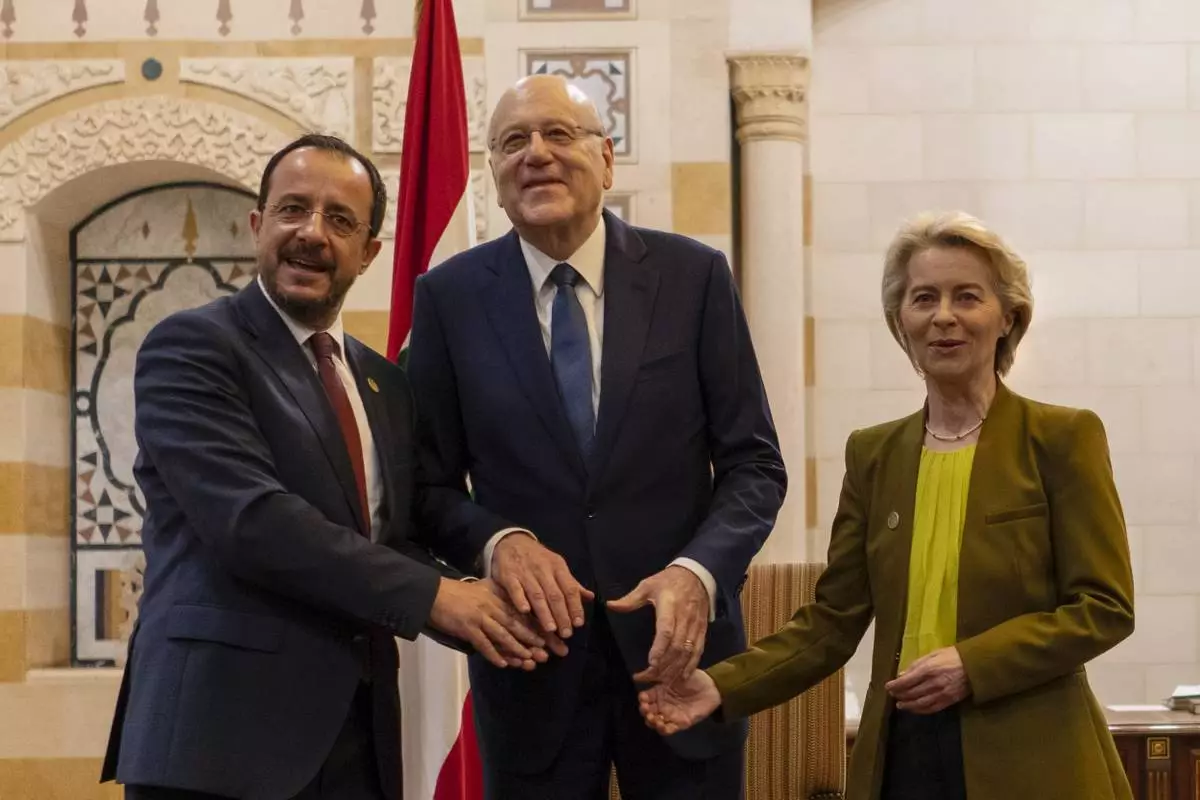
Lebanese caretaker Prime Minister Najib Mikati, center, Cyprus' President Nikos Christodoulides, left, and President of the European Commission Ursula von der Leyen pose for photograph at the government palace in Beirut, Lebanon, Thursday, May 2, 2024. (AP Photo/Hassan Ammar)
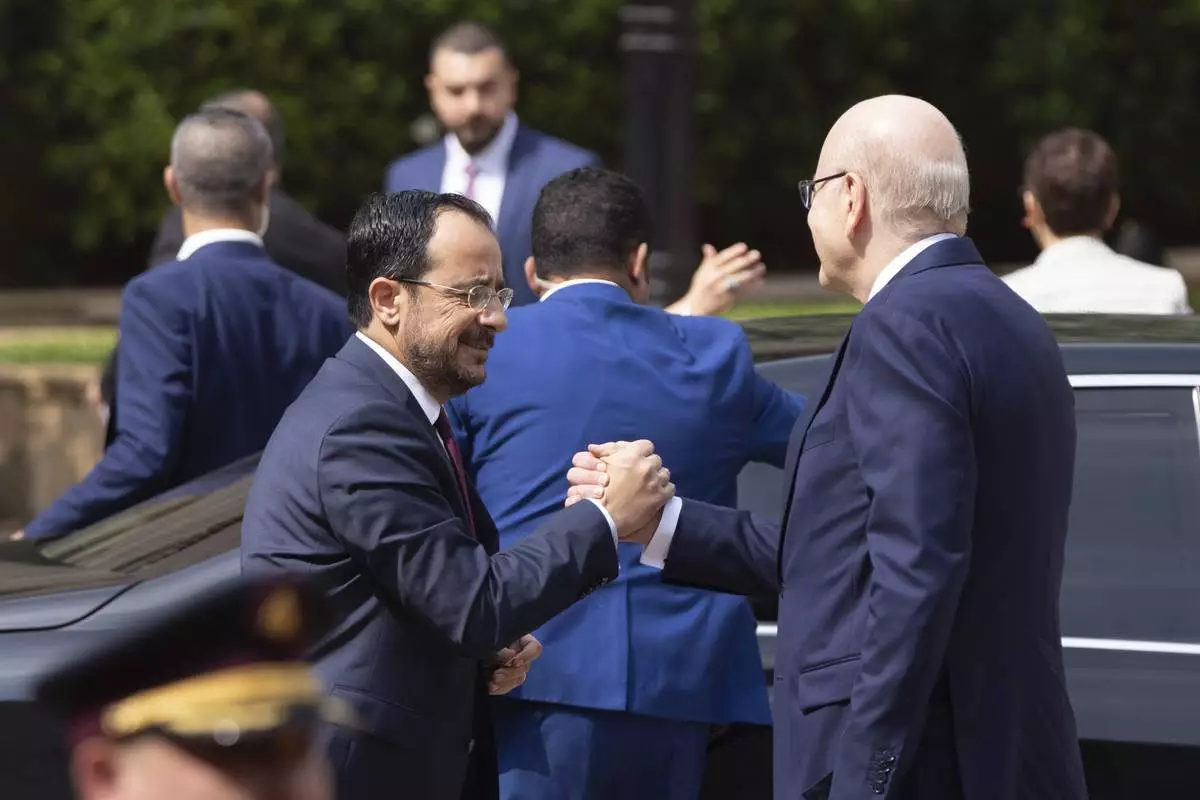
Lebanese caretaker Prime Minister Najib Mikati, right, welcomes Cyprus' president Nikos Christodoulides before their meeting at the government palace in Beirut, Lebanon, Thursday, May 2, 2024. (AP Photo/Hassan Ammar)

Cyprus' President Nikos Christodoulides, left, and President of the European Commission Ursula von der Leyen, center, review an honor guard upon their arrival to meet with the Lebanese Speaker Nabih Berri, in Beirut, Thursday, May 2, 2024. (AP Photo/Hussein Malla)

Lebanese caretaker Prime Minister Najib Mikati, center, speaks during his meeting with Cyprus' President Nikos Christodoulides, left, and President of the European Commission Ursula von der Leyen at the government palace in Beirut, Lebanon, Thursday, May 2, 2024. (AP Photo/Hassan Ammar)
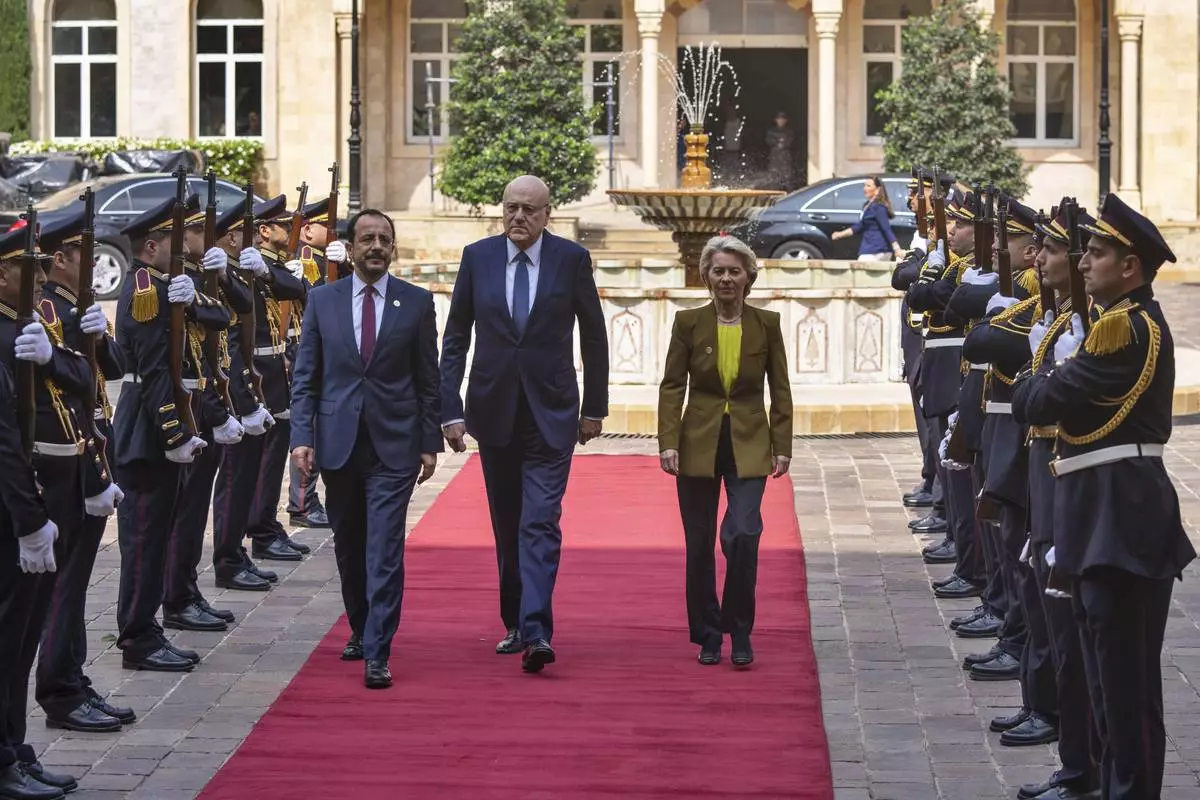
Lebanese caretaker Prime Minister Najib Mikati, center, welcomes Cyprus' President Nikos Christodoulides, left, and President of the European Commission Ursula von der Leyen at the government palace in Beirut, Lebanon, Thursday, May 2, 2024. (AP Photo/Hassan Ammar)












